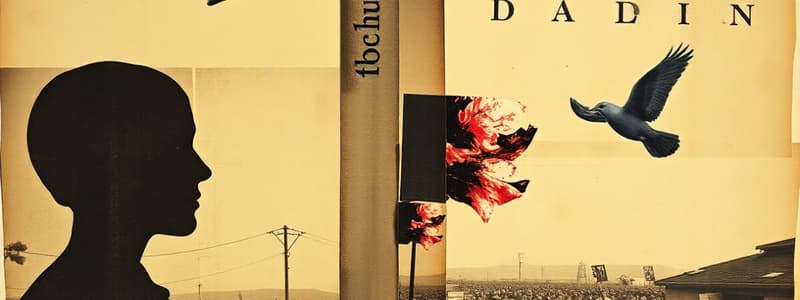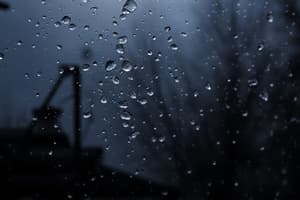Podcast
Questions and Answers
What is the purpose of a pantograph in photography?
What is the purpose of a pantograph in photography?
- To develop photos instantly.
- To capture images using sunlight.
- To create three-dimensional images.
- To enlarge or reduce images. (correct)
Which photographic process creates a dark image against a light background?
Which photographic process creates a dark image against a light background?
- Ambrotype
- Cyanotype
- Heliography
- Silhouette (correct)
What does the term 'latent image' refer to in photography?
What does the term 'latent image' refer to in photography?
- An image that has been exposed to light.
- An invisible image not yet visible to the naked eye. (correct)
- A print that emphasizes artistic composition.
- An image developed on albumen paper.
Which early photographic process uses paper negatives?
Which early photographic process uses paper negatives?
What is a key characteristic of straight photography?
What is a key characteristic of straight photography?
Which of these processes involves the use of ferric salts to produce prints?
Which of these processes involves the use of ferric salts to produce prints?
What distinguishes a tintype in photography?
What distinguishes a tintype in photography?
Which photographic technique emphasizes artistic composition rather than a realistic depiction?
Which photographic technique emphasizes artistic composition rather than a realistic depiction?
What is the primary function of a Camera Obscura?
What is the primary function of a Camera Obscura?
Which photographic process is recognized for using a dry plate?
Which photographic process is recognized for using a dry plate?
Flashcards
Pantograph
Pantograph
A mechanical device for enlarging or reducing images.
Heliography
Heliography
An early process for creating images using sunlight and light-sensitive materials.
Daguerreotype
Daguerreotype
An early photographic process producing a direct positive image on a silver-coated copper plate.
Calotype
Calotype
Signup and view all the flashcards
Collodion (Wet-Plate)
Collodion (Wet-Plate)
Signup and view all the flashcards
Albumen print
Albumen print
Signup and view all the flashcards
DOP (Developed Out Print)
DOP (Developed Out Print)
Signup and view all the flashcards
Baryta
Baryta
Signup and view all the flashcards
Combination Printing
Combination Printing
Signup and view all the flashcards
Cyanotype
Cyanotype
Signup and view all the flashcards
Study Notes
Photography Terminology
- Pantograph: A mechanical device used to enlarge or reduce drawings.
- Physionotrace: An early method of creating a portrait.
- Silhouette: A darkened profile, a method of representing a shape.
- Camera lucida: A device that projects an image onto a surface for tracing.
- Camera obscura: A darkened room with a small hole that projects an image onto the opposite wall.
- Sun printing: Creating images using sunlight as a source.
- Heliography: Creating images using light-sensitive materials.
- Daguerreotype: An early photographic process producing a positive image on a silver plate.
- Calotype: An early photographic process creating a negative image.
- Collodion (wet-plate): A photographic process requiring wet plates, a rapid method.
- Albumen paper: Photographic paper coated with egg white.
- Combination printing: A technique combining different photographic processes.
- Negative/positive/direct positive: Methods relating to images' tones (positive or negative).
- 3-part laminar structure of photographs: A layered structure describing different processes in image creation.
- Latent image: An invisible image formed by the reaction with light-sensitive materials.
- Tintype: A photographic process creating images on a metal plate.
- Ambrotype: An early positive photographic process on glass.
- Cartes de visite: Small photographic portraits popular in the 19th century.
- Cyanotype: A photographic process creating Prussian blue prints.
- Stereoscopy/stereograph: A technique creating images seen in 3D.
- Dry plate: A photographic plate not requiring wet chemistry.
- Instantaneous photography: A method for creating quick photographic images.
Photography Processes
- Snapshot: A quick photographic image.
- Kodak: A famous photographic company.
- Magic lantern: A device projecting images onto a screen for viewing.
- Magnesium flash: A flash bulb technique.
- Pictorialism: A style of photography emphasizing artistic quality.
- Salt print: An early photographic print.
- Platinum print: A high-quality photographic print.
- Gelatin silver print: A common method using light-sensitive gelatin.
- POP (Printed out print): Short for an image printed straight from the source.
- DOP (Developed out print): Short for an image developed & printed from a process.
- Baryta: A coating for photographic paper.
- Half-tone: A process creating a continuous tone effect from a series of dots.
- Straight photography: A style emphasizing a direct expression of reality.
- Pre-visualisation: The mental process of creating an image in one's mind.
- Photogravure: A printing technique producing images from engraved plates.
- Gum printing: A photographic printing process involving gum.
- Celluloid/nitrate film: An early film material.
- Photomechanical reproduction: Techniques for making multiple copies of images.
- Photo-magazine: Publications including photographic images and articles.
- Autochrome: An early color photographic process.
- Kodachrome: A color photographic film.
Studying That Suits You
Use AI to generate personalized quizzes and flashcards to suit your learning preferences.




